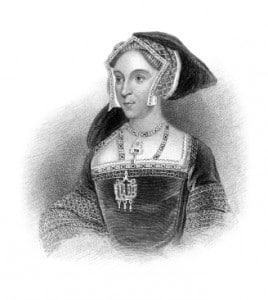 On this day in 1537, Queen Jane Seymour felt her unborn baby move for the first time. The “quickening” of her child sparked off celebrations around the country. In London a Te Deum was sung, fires were lit and wine was enjoyed by the people:
On this day in 1537, Queen Jane Seymour felt her unborn baby move for the first time. The “quickening” of her child sparked off celebrations around the country. In London a Te Deum was sung, fires were lit and wine was enjoyed by the people:
“Alsoe, the 27th daye of Maye 1537, being Trynytie Sondaye, there was Te Deum sounge in Powles for joye of the Queenes quickninge of childe, my Lord Chaunseler, Lord Privaye Seale, with diverse other Lordes and Bishopps, beinge then present; the Mayre and Aldermen with the beste craftes of the cyttye beinge there in their lyveryes, all gevinge laude and prayse to God for joye of the same, wher the Bishopp of Worcester, called Docter Latymer, made an oration afore all the Lordes and Commons, after Te Deum was songe, shewinge the cause of their assemblye, which oration was mervelouse fruitefull to the hearers; and alsoe the same night was diverse greate fyers made in London, and a hogeshead of wyne at everye fyer for poore people to drinke as longe as yt woulde laste; I praye Jesue, and it be his will, send us a Prince.”1
and a sermon was preached at Oxford:
“The last and greatest benefit, the special cause of their assembly, is “that our most excellent lady and mistress queen Jane, our noble and godly prince’s, King Henry the Eighth’s, wife, hath conceived and is great with child, and upon Trinity Sunday, like one given of God, the child quickened in the mother’s womb.” Exhorts them to give praise, and pray that it may be a prince.”2
On 1st June, William, Lord Sandys, wrote to Lord Lisle regarding the celebrations organised in Guines and Calais:
“I have this afternoon received from you the most joyful news ever sent me. No greater comfort ever came to my knowledge next to the prosperous estate of our Sovereign lord. You inform me that fires are to be made and Te Denm sung, and guns shot off at Calais at 4 o’clock. Too much honour cannot be done to the occasion, and I will do the same here, but this day is too far spent to do it publicly, and I have warned the curates of this county to meet at the parish church to-morrow morning and have a solemn mass with Te Denm after. There will also be a fire in the market-place and gun shot; so I trust the news will be known to all my neighbours, and your Lordship will perceive the doing thereof, if the wind suffer it to be heard.”3
And on 3rd June, the Duke of Norfolk wrote to Cromwell to tell him about the preparations for celebrations in York:
“Hopkins will report what he has done about the good news of the Queen’s being quick with child. This afternoon Te Deum shall be sung and this night bonfires made through all this city. Has ordered four hogsheads of wine out of his cellar to be laid abroad at night to be drunk in divers places freely.”4
There was hope of a new prince, an heir to the throne.
Also on this day in history…
- The Execution of Margaret Pole, Countess of Salisbury – click here to read more.
Notes and Sources
- Wriotheseley, Charles. A chronicle of England during the reigns of the Tudors, from A.D. 1485 to 1559, p64
- LP xii, i. 1325
- LP xii, ii. 11
- LP xii, ii. 22